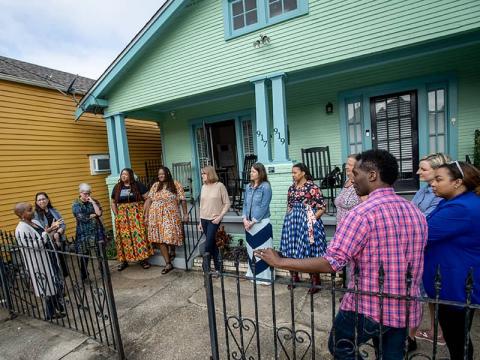Tulane program for K-12 students exposed to violence will expand nationally
Ongoing exposure to violence can leave children in a constant state of alarm.
That state, which psychologists call “survival brain,” can result in poor grades, missed classes and disruptive behavior, often leading to suspensions and expulsions.
For the past seven years, Tulane University trauma psychologists have been teaching New Orleans schools how to best reach these students who are most at risk for falling behind. Now, they’ve received a $1.17 million grant from the Substance Abuse and Mental Health Services Administration (SAMHSA) to take the successful program to schools across Louisiana and the nation.
“When students come to trust their schools as safe places, being in survival mode becomes unnecessary,” said Stacy Overstreet, PhD, a psychology professor in the Tulane School of Science and Engineering. “The changes we’re working with teachers to implement are helping students feel seen, heard and understood.”
Overstreet and Tulane psychology professor Courtney Baker, PhD, have been working with the Coalition for Compassionate Schools to train faculty, staff and administrators in how to recognize the reality and impact of trauma and adopt approaches that lead to positive student-teacher relationships, culturally responsive discipline practices and feelings of physical, social and emotional safety among students.
They recently documented the program’s success in a report, Coalition for Compassionate Schools: Enhancing School Capacity to Recognize and Respond to the Needs of Educators and Students, which helped them secure the grant to expand the training.
“We have developed a promising framework for the effective installation of trauma-informed approaches in schools,” Overstreet said. “Being a national center allows us to share our tools and trainings with school districts across the state and the country so that they can build the capacity to adopt trauma-informed approaches.”
The Coalition for Compassionate Schools will now become a National Child Traumatic Stress Treatment and Service Adaptation Center.
Among U.S. states, Louisiana has the third highest number of children per capita who have experienced two or more traumatic life events, according to the KIDS COUNT Data Center of the Annie E. Casey Foundation.
Other groups in the Coalition include Beloved Community, Children’s Bureau of New Orleans, Institute of Women and Ethnic Studies, Louisiana Public Health Institute, New Orleans Children and Youth Planning Board (CYPB), New Orleans Health Department, New Orleans Youth Alliance, NOLA Public Schools and Project Fleur-de-Lis at Mercy Family Center. Avery T. Brewton, LCSW, and Teddy McGlynn-Wright, MSW, lead the Coalition’s Training of Trainers program.
With the SAMHSA grant, the Coalition will expand its work into after-school programs as well as youth-serving organizations. It will also hold quarterly sessions to help educators deal with secondary traumatic stress, which can arise when working closely with students who have experienced trauma.
"New Orleans needs this investment in the well-being of its youth now more than ever,” said Karen Evans, executive director of the New Orleans Children and Youth Planning Board who has worked on the Citywide Youth Master Plan. “I'm excited to be a supporter of the work, and I'm even more excited that our city's schools will be more prepared to help our children heal and be well.”
The Coalition is also taking part in the city’s recently created Mental Health Collaborative, which received its own $1.7 million grant from SAMHSA to expand and coordinate mental health services for youth.
Overstreet said student views on trauma, healing and resilience are critical to the Coalition’s work, and a second grant from the Spencer Foundation, which funds educational research, will enable the group to hear more from students. Overstreet will serve as principal investigator on that research, with Samantha Francois, PhD, an assistant professor in the Tulane School of Social Work and executive director of the Violence Prevention Institute, serving as co-principal investigator.

